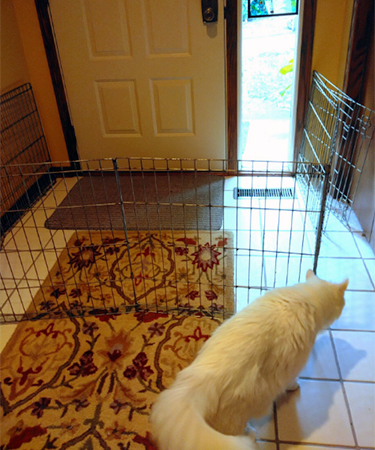Door dashing can be a dangerous habit for you and your cat. However, it can be easily corrected with patience and proper training. Before entering your house in any situation, be sure to take time to set down any bags and peek inside to ensure your cat is not waiting by the door and revving his engine.
Make sure your cat is properly identified and/or microchipped. Doing so will better the chances of him being returned to you in case he slips out the door.
Spay or neuter your cat. Intact adolescent and adult male cats and female cats that are in heat tend to dash out the door whenever they smell a potential mate. For best results in nixing this behavior, make sure to spay or neuter your cat as soon as possible.
Pick out a specific “greeting spot” in your home that is far away from the door. All hellos and goodbyes should be done in this area. Furthermore, some one-on-one time with your cat should take place in that area; this includes petting, playtime, grooming, treats, etc. This establishes the area as a source of value for your cat. If your cat is waiting for you at the door when you get home, ignore him and proceed to the greeting area, saying hello once he meets you in this spot. This will help teach your cat to wait by this area rather than by the door when you are leaving or returning home.
Create a distraction for your cat before leaving the house by giving him a yummy irresistible treat, ideally in a food puzzle, or a couple of his favorite toys to play with away from the door. If your cat still insists on following you to the door, toss one of his favorite toys across the room to distract his attention before opening the door. Keep a stash of treats or toys outside/in your bag so that you can toss them for your cat as you open the door when you return home.

Prevent access to the door by placing a tall X-pen around the doorway, creating an air lock as demonstrated below.
If you would like information from an Anti-Cruelty Behavior Specialist regarding this behavior topic, please call 312-645-8253 or email behavior@anticruelty.org.
